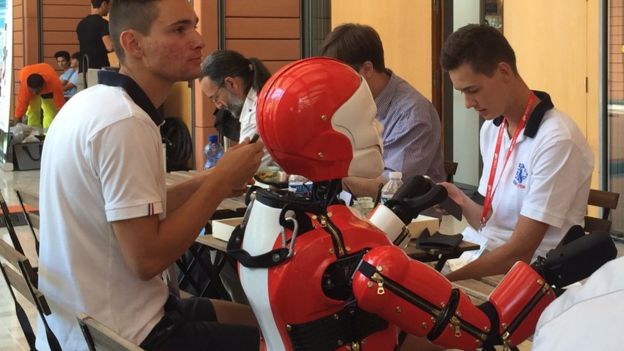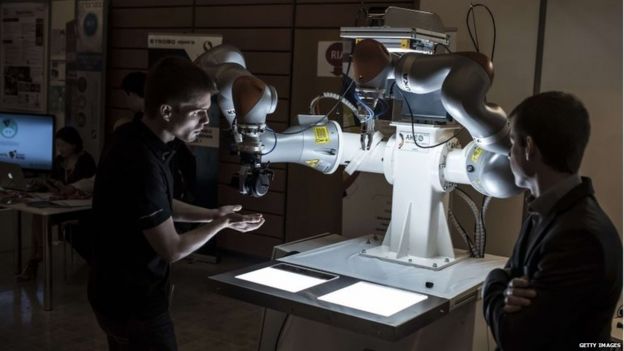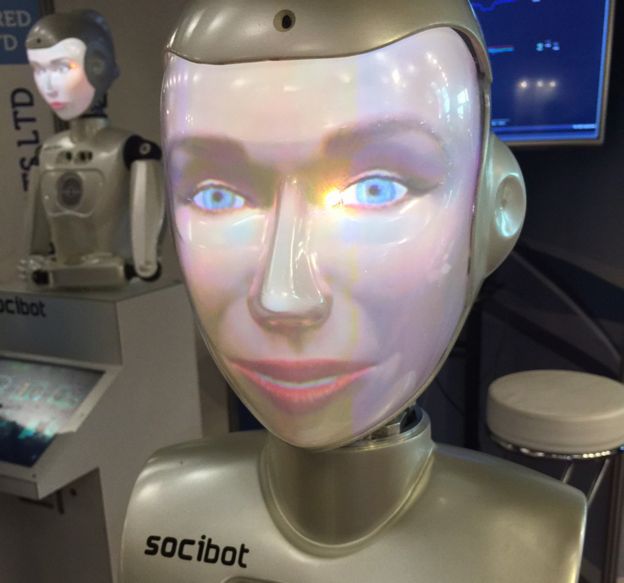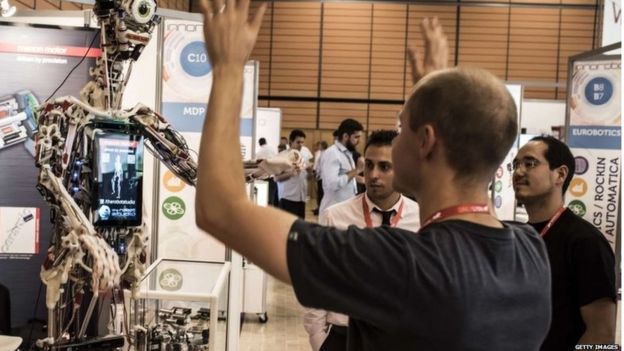Robots on the march

Sitting eating a hot dog outside Lyon's exhibition centre, I couldn't help noticing the group at the next table. Three young men were chatting while a fourth sat completely immobile, not saying a word.
Maybe that was because the fourth was a robot.
Nobody batted an eyelid, as other people came and took a screwdriver to the humanoid device, but then this was Innorobo, Europe's largest robotics event, and here you get a flavour of a future where robots live amongst us.
To anyone who's roamed the vast halls of tech events like the Consumer Electronics Show (CES) in Las Vegas or Barcelona's Mobile World Congress this will seem a tiny, almost parochial, event.

You can walk from one end of Innorobo to the other in five minutes - but in that time you will see more innovation packed into a small space than you will ever find in those gigantic shows.
The show's focus has in the past been on industrial robotics, and there are plenty of advances on this front.
I spotted a robotic arm delicately picking up individual chocolates and placing them in a box, air-quality robots that can wander a factory reporting back on pollution levels, and cupboards on castors picking a route through a crowd to deliver tools to workers at the other end of the hall.

But the star of the show was undoubtedly Pepper, the most advanced domestic robot to go on sale to the general public. When this French-made humanoid robot companion was offered to Japanese consumers last month for quite a hefty price, it sold out within a minute.
Meeting Pepper, I was not quite sure why. He or she - it seems you decide the gender - does not undertake any practical tasks, but is designed to engage with you on an emotional level. "Pepper won't do the dishes" explains Magali Cubier of Aldebaran Robotics, "but if Pepper can see you are sad, then Pepper will propose a game to cheer you up.
How does the robot know I'm sad? It is packed with sensors which can for instance detect a sad face or intonation in your voice, so this internet-connected device may decide now is not the moment to read out the news headlines. This robot is solely devoted to being your companion, sensitive to your every mood - it can even dance with you, though I'm not sure my moves impressed Pepper.
Aldebaran's owners Softbank chose Japan as the launch market. knowing the idea of a relationship with a robot was more likely to fly in a country where technology is readily accepted in homes. Elsewhere, there may be less enthusiasm.
Across the show floor I found the veteran British robot engineer Will Jackson was sceptical about devices like Pepper invading the home any time soon.
He thinks the cost and dubious utility of a one-to-one robot will be a barrier. But he does see a growing role in the commercial world for products like his Robothespian and Socibot, robots that can entertain and interact on some level with humans, taking over some roles in service industries.
"Walk into a supermarket in a few years time, and a robot will know who you are, your complete shopping history, and may try to help you or to sell you stuff."

It is facial recognition technology that will enable robots to recognise us - and that's just one of the controversial issues hanging over this fast growing industry. As well as privacy, there are concerns about safety, with the tragic news of the death of a worker crushed by a robot at a Volkswagen factory. Until recently, all industrial robots were locked behind cages to prevent this kind of accident because they were not smart enough to detect a human in their path.
Now they are getting more sensitive, but releasing them from their cages may bring added risks.
And then there's the question of jobs. One firm here is showing off an autonomous forklift truck, effortlessly shifting pallets without the aid of a driver. The driver is the most expensive element of a forklift, so the product pays for itself within a year, according to Fabien Bardinet of Balyo, the company behind the autonomous driving technology. But I put it to him that we should worry about the threat to the workforce.
"Forget about it, - they are going to help us, make jobs simpler," is his response.

His thesis is that by making companies more competitive, adopting robots will create jobs rather than destroy them. And he points out that Germany, which employs far more industrial robots than France, has a lower level of unemployment.
Let's not exaggerate the threat from the robots - they are still very bad at things we find easy, like climbing stairs or telling jokes.
But over the next few years we could see them gradually filling more human roles, from sales assistants to child minders to taxi drivers. And we - the humans - will have to decide how far this robot revolution should go.




No comments: